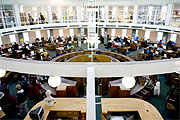Source: Donated by a member of public, rights unknown.
Notable People
Ethel Dobbie Currie
-
Ethel Dobbie Currie

-
Ethel Dobbie Currie

Source: Glasgow Geological Society
-
Ethel Dobbie Currie

Source: University of Glasgow
-
Department of Geology 1950s

Source: University of Glasgow
-
Ethel Currie's matriculation record, 1916

Source: University of Glasgow
Geologist
Born 4 December 1899, Glasgow, Scotland.
Died 24 March 1963.
A distinguished geologist and one of the first women to be appointed as a Fellow of the Royal Society of Edinburgh.
Connection to the University of Glasgow: GU Degrees: BSc, 1920; PhD, 1923; DSc, 1945;
Discover more geologists; museum curators on the University of Glasgow Story website
Achievements
The following achievement is associated with Ethel Dobbie Currie:
Leading the study of Scottish Carboniferous Goniatites
Currie's primary research interest was in the field of palaeontology in which she published a number of academic works.
Honours
The following honours are associated with this person:
Biography
Ethel Dobbie Currie (1899-1963) was a University graduate and a distinguished geologist. She became Assistant Curator of the Hunterian Museum during the early 1920s and was promoted to the grade of Senior Lecturer in 1960.
Born in Glasgow in 1899, Currie was educated at Bellahouston Academy before coming to the University to study geology during the First World War. After she graduated BSc in 1920 she briefly worked as a Demonstrator in Professor John Gregory's department, before Professor Gregory invited her to assist with the care and arrangement of the geological collections in the Hunterian Museum. She accepted and held the post of Assistant Curator until she retired in September 1962.
Currie's primary research interest was in the field of palaeontology, and she published a number of academic works, beginning with a joint paper with Professor Gregory on fossil sea-urchins.
She received the Royal Society of Edinburgh's Neill Prize in 1945 and four years later, with Sheina Macalister Marshall, she was one of the first women to be made a Fellow, having been proposed by a number of distinguished figures including Sir Edward Bailey Balfour. In 1952 she became the first woman President of the Geological Society of Glasgow. She was acknowledged by the Geological Society of London in the award of its Wollaston Fund.

